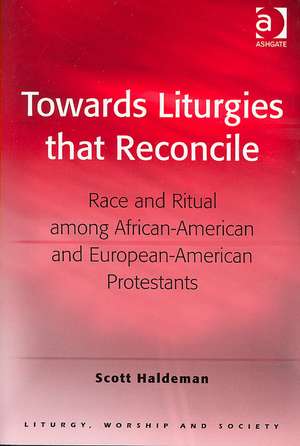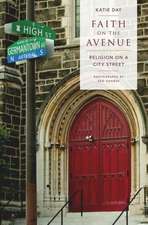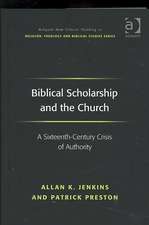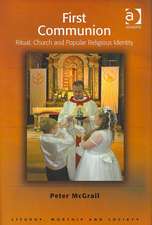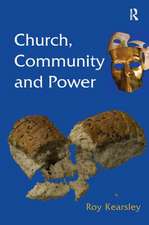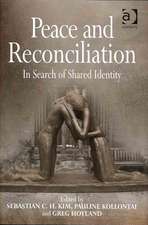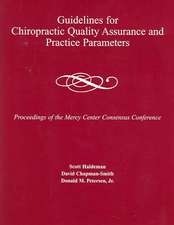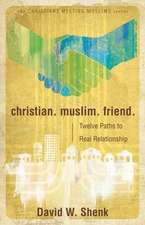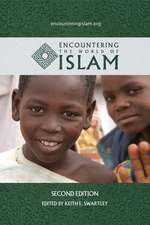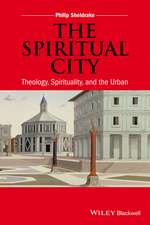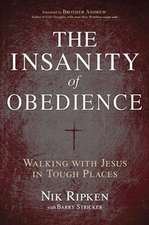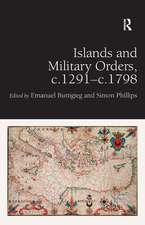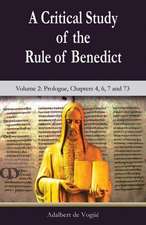Towards Liturgies that Reconcile: Race and Ritual among African-American and European-American Protestants: Liturgy, Worship and Society Series
Autor Scott Haldemanen Limba Engleză Hardback – 28 apr 2007
| Toate formatele și edițiile | Preț | Express |
|---|---|---|
| Paperback (1) | 382.36 lei 6-8 săpt. | |
| Taylor & Francis – 30 sep 2021 | 382.36 lei 6-8 săpt. | |
| Hardback (1) | 1000.27 lei 6-8 săpt. | |
| Taylor & Francis – 28 apr 2007 | 1000.27 lei 6-8 săpt. |
Din seria Liturgy, Worship and Society Series
-
 Preț: 356.16 lei
Preț: 356.16 lei -
 Preț: 349.40 lei
Preț: 349.40 lei -
 Preț: 369.73 lei
Preț: 369.73 lei - 19%
 Preț: 256.48 lei
Preț: 256.48 lei -
 Preț: 457.14 lei
Preț: 457.14 lei -
 Preț: 382.36 lei
Preț: 382.36 lei -
 Preț: 389.66 lei
Preț: 389.66 lei -
 Preț: 380.84 lei
Preț: 380.84 lei -
 Preț: 469.34 lei
Preț: 469.34 lei -
 Preț: 377.45 lei
Preț: 377.45 lei -
 Preț: 416.44 lei
Preț: 416.44 lei -
 Preț: 489.26 lei
Preț: 489.26 lei -
 Preț: 416.22 lei
Preț: 416.22 lei -
 Preț: 469.34 lei
Preț: 469.34 lei -
 Preț: 384.48 lei
Preț: 384.48 lei -
 Preț: 469.34 lei
Preț: 469.34 lei -
 Preț: 395.04 lei
Preț: 395.04 lei - 21%
 Preț: 256.32 lei
Preț: 256.32 lei -
 Preț: 392.28 lei
Preț: 392.28 lei -
 Preț: 389.38 lei
Preț: 389.38 lei -
 Preț: 386.57 lei
Preț: 386.57 lei
Preț: 1000.27 lei
Preț vechi: 1219.84 lei
-18% Nou
Puncte Express: 1500
Preț estimativ în valută:
191.40€ • 200.37$ • 158.37£
191.40€ • 200.37$ • 158.37£
Carte tipărită la comandă
Livrare economică 05-19 aprilie
Preluare comenzi: 021 569.72.76
Specificații
ISBN-13: 9780754657262
ISBN-10: 0754657264
Pagini: 196
Dimensiuni: 156 x 234 x 13 mm
Greutate: 0.45 kg
Ediția:1
Editura: Taylor & Francis
Colecția Routledge
Seria Liturgy, Worship and Society Series
Locul publicării:Oxford, United Kingdom
ISBN-10: 0754657264
Pagini: 196
Dimensiuni: 156 x 234 x 13 mm
Greutate: 0.45 kg
Ediția:1
Editura: Taylor & Francis
Colecția Routledge
Seria Liturgy, Worship and Society Series
Locul publicării:Oxford, United Kingdom
Cuprins
Contents: Preface; Liturgical theology in context; 'Once you were no people...now you are God's people': an analytical narrative of the construction of African-American Protestant liturgical traditions; 'Cities on hills': an analytical narrative of the construction of European-American Protestant liturgical traditions; Barriers built, barriers broken: the intersection of African-American and European-American liturgical traditions; 'Discerning the body': US racism, Protestant worship, and sacramental theology; Notes to text; Bibliography; Index.
Notă biografică
Scott Haldeman is Assistant Professor of Worship at Chicago Theological Seminary, Chicago, Illinois, USA. Founding convener of the African American Liturgical Traditions Seminar of the North American Academy of Liturgy, he studies worship traditions in U.S. Protestantism too often neglected by scholars in order to sketch a truer portrait of the diversity of worship among the churches, both historically and today. His publications include "American Racism and the Promise of Pentecost" in Liturgy: No Longer Strangers 14:4 (Washington, DC: The Liturgical Conference), 34-50.
Recenzii
’... this book provides an excellent discussion of a much neglected dimension of American religion and race relations and thus deserves a wide readership across disciplines.’ Journal of Contemporary Religion ’Haldeman guides us through a vast field of complexities with knowledge and skill...’ Anaphora ’This volume makes an excellent contribution to forging this renewed vision, and deserves a wide readership among both Catholics and Protestants.’ Worship
Descriere
Towards Liturgies that Reconcile reflects upon Christian worship as it is shaped, and mis-shaped, by human prejudice, specifically by racism. African Americans and European Americans have lived together for 400 years on the continent of North America, but they have done so as slave and master, outsider and insider, oppressed and oppressor. Scott Haldeman traces the development of Protestant worship among whites and blacks, showing that the following exist in tension: African American and European American Protestant liturgical traditions are both interdependent and distinct; and that multicultural communities must both understand and celebrate the uniqueness of various member groups while also accepting the risk and possibility of praying themselves into an integrated body, one new culture.
